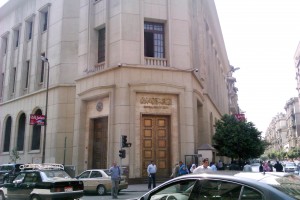
(Abdelazim Saafan/DNE Photo)
The Central Bank of Egypt (CBE) announced a $1.6bn increase in Egypt’s net foreign currency reserves to $16.04bn at the end of May, but analysts warn this is a “temporary phenomenon”.
Analysts stated that certain factors like imports, exports, production and tourism are not taken into consideration when analysing the rise, giving a misleading indication of an economic improvement.
This is the second consecutive increase after Egypt’s foreign currency reserves rose to $14.42bn in April after a low of $13.4bn in March.
Financial expert Magdy Tolba described the rise in the levels as “temporary”, adding that vital factors are not included in the net reserves.
“We can’t say that there’s a real economic increase by simply looking at the rise in the levels, as important factors like imports and exports are not included,” Tolba said.
In May, former planning and international cooperation minister Ashraf Al-Araby forecasted foreign reserves to increase to $19bn by the end of this year.
However financial expert Alaa Moustafa said any increase is “unlikely as long as political instability remains.”
Moustafa said the recent injections of foreign aid from Qatar, Turkey and Libya bolstered reserves, but significant elements have been missing from the analysis.
Last year, Qatar deposited $4bn with the CBE, with a further $3bn pledged to Egyptian treasury bonds at an expected rate of interest of 3.5%.
“In order to not jump to any conclusions, we must first look at factors such as tourism revenues, production and exportation,” Moustafa said. “We have a real problem in all these elements which are heavily influenced by political instability.
“We can’t really say there’s a real boost in the reserves as long as these elements are still negatively affected.”
Tolba added that the foreign aid injected in Egypt “is not an indication of a true increase”.
Saudi Arabia and Turkey deposited $1bn each, and Turkey has announced last month to increase its $1bn credit line by $250m. Libya on the other hand deposited $2bn.
Egypt’s net foreign currency reserves stood at $36bn on the eve of the 25 January Revolution and have depreciated by more than half since then.
Low foreign currency reserves means Egypt is struggling to purchase basic commodities, including wheat.
The lack of foreign currency forced Egypt, one of the world’s largest wheat importers, to cut back on wheat purchases this year and rely more on the domestic harvest.
But the CBE published a press release in March denying any significant decline in the country’s foreign reserves.
“We published the press release because the media has been publishing inaccurate and false reports,” said the bank’s press office at the time.
The statement explained this move as a way to “restore trust in the Egyptian economy and protect the country’s economic affairs.”



